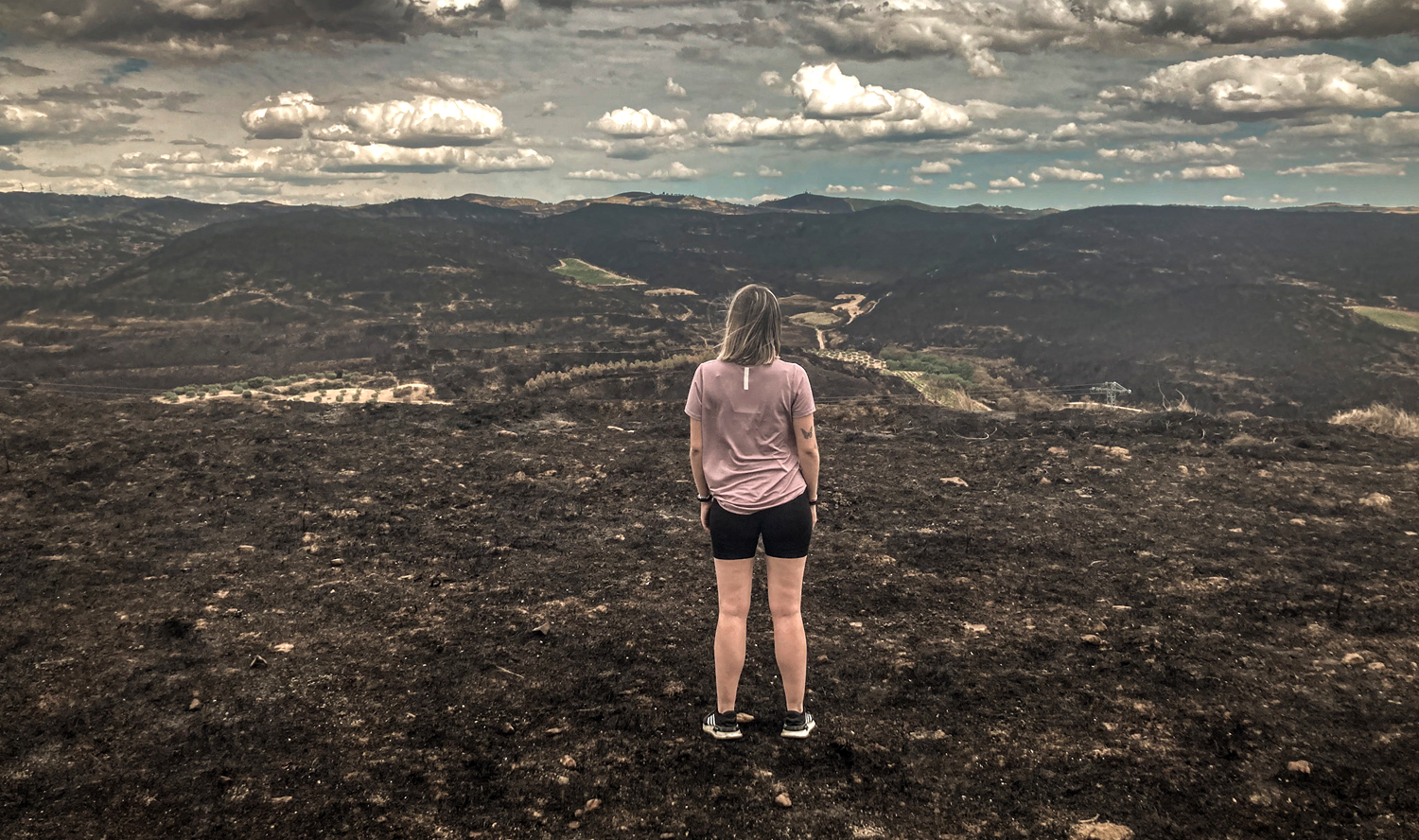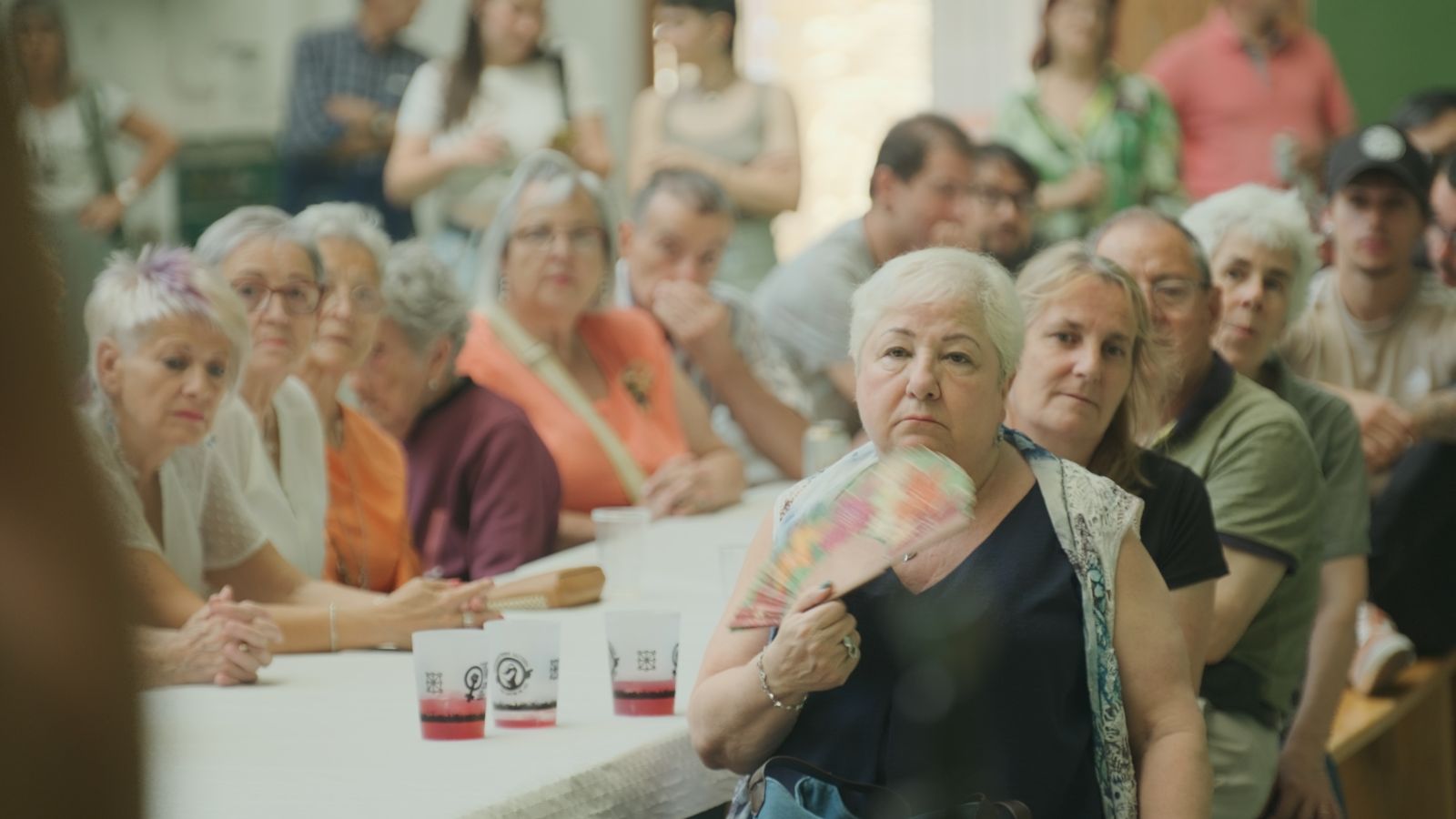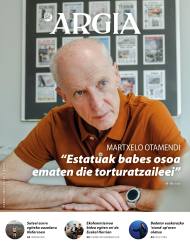Auzolan and collaboration in fire-fighting
- Last summer the fires left a dark panorama in Navarra, burning 95% of the lands of San Martín de Unx in the photo. Much was said in the media about the damage caused by the fires, but how did you face the context in which more and more fires can occur? The interviewees in this report have denounced the lack of interest of the Government of Navarra, will the resident work be the solution?

It is thirteen months since the fire invaded Navarra and caused terrible damage. Last year was the largest fire recorded: It burned more than 10,000 hectares and damaged some 15,000 hectares. To make an idea, Álava has a total of 9,143 hectares. San Martín de Unx, Ujué, Legarda, Muruzabal, Obanos, Arga, Guirguillano and Arraiza were among the most affected peoples. Human damage, fortunately, was not significant.
The San Martin de Unx fire lasted three days and 95% of the land was burned, but Mayor Javier Leoz said they saved the people “at the last moment,” but saved him. To combat the fire and repair the damage caused, EUR 53 million has been spent. According to the farmer Xabier Unzue, investing in prevention would be much more effective: “Imagine that every year half of that is used to prevent, there would be no such disaster.”
The main measure of the Government of Navarre has been to make municipalities jointly responsible, demanding preventive measures, but the resources of the municipalities of small municipalities are scarce
Government plan
However, the Government of Navarre is aware later of what may cause a fire, as in the months after the fire the Government Plan of 2023 was agreed. It decided on measures to prevent, monitor and extinguish fires. In August 2022 the Royal State Decree was approved and the Government of Navarra adapted it to the territory. The Royal Decree prohibited, inter alia, the ground use of fire-producing machinery and the harvest in time of drought. Derogations have now been made: the harvest cannot be stored above 42ºC, and when the alert is orange and yellow it can be collected, provided that preventive measures are taken. Therefore, these works must be supervised by the General Directorate of Public Works and Infrastructure, adapting them to the conditions.
Measures may or may not be of public interest and, above all, may or may not be effective in preventing fires. Today, according to our partners, it is clear that the political will of the Government of Navarra to combat fires is minimal. There is only one analysis of the date on which the last fire-fighting plan is 2013, before its publication, and 1999. In the same vein, Unzue has called for the profitability of investing in low-population countries and has denounced that “peoples are of little importance today”.
The Government ' s main measure has been to pass on responsibility to the municipalities, asking them to put in place preventive measures. Municipalities will follow the same path: to establish measures and standards. They will surely admit that roads and land must be kept clean, for example to cut fires and to allow fire fighters to access, but the resources of small town councils are scarce. The farmer sets an example: “Will the City Hall order the owners to clean their land, but someone 80 years old will start to sprout the land? I don't think so. More, more resources are needed.”
President of organic farmers Ibai Sueskun Errigora and Miriam Otxotorena CPAEN-NNPEK underline that the measures of the Government of Navarra are “minimal and very bureaucratic”. By the way, Unai denounces the lack of priority: “A lot of money is moving around the fires and they cause a mere propaganda show. Then politicians say they’re against fires, but I’m not so clear.”
Miriam Otxotorena and Xabier Unzue stress that the most important prevention is livestock, which keeps the rural environment "clean and healthy"
Giant Auzolan of the Rota
From the flame of the fires and the lack of political will of the Government of Navarra they built a transformative project from Errigorri, a popular initiative focused on Euskera and resident work. Sueskun said it was not such a complicated issue: “People needed help and we offered help.” On 3 July 2022, a press conference announced the launch of a levy and the setting up of a panel of experts to manage the money obtained, including firefighters, forest guards, farmers, etc.

They got around 90,000 euros in total and set up a table of six specialists to invest that money: Miriam Otxotorena (President of the CPAEN-NNPEK Council), Mikel Tabar (forestry manager), Victor Rubio (firefighter), Patxiku Irisarri (Member of the Association of Farmers of the Basque Country in Navarra), Juan Carlos Castillo (Mayor of Peralta and Director of Councillors and Peoples of Navarre)
He decided to invest the money between two peoples: Ujué and San Martín de Unx. A decalogue was created for the prevention of fires, so that these two towns can serve as a reference point and also use it in the rest of Navarre. It should be said that these localities were not chosen randomly, since the fire had a great influence on them, and also the citizenship showed a great will to implement the project.
They laid down three premises for fire prevention: strengthening extensive livestock farming, protecting villages or cores and creating green belts or walls. The first helps to keep the rural environment clean, without accumulating waste; the second and third, divide and protect peoples and the rural environment.

To complete the decalogue, first, the systematic origin of the fire and the weakest point of these peoples were analyzed. In Ujué, for example, the town has a single entrance, a single road, and if the fire prevents that entry, the fire brigade cannot enter. Therefore, the work began to make a new entry.
In addition, cleanings from rural areas were launched to prevent garbage and to make fire more difficult in the future. The type of plant was also analyzed, as wheat promotes the spread of fire much more easily than olive trees. Therefore, they prioritized the planting of olive trees near the villages and the protection of the centers.
Installation of ski resorts in the Pyrenees, construction of windmills, solar plate projects, construction of water dams, mass tourism... Farmer Unzue claims that villages are used exclusively for their current exploitation
Ignore in recent years
There is less and less population in rural areas and Otxotorena explains that the trend is accentuated. According to Unzué, the fact that governments invest little in people and that fewer and fewer people live is a “witch wheel”. According to Otxotorena, in the rural environment “some administrative and social customs have been lost: in the communal lands, no investment has been made, sometimes animals have been introduced but in others not, the locks are often not adequate, lack of water for the animals and the houses have been built near the rural areas”.
Changes in habits have affected and will continue to affect fires in the future. Miriam Otxotorena and Xabier Unzue stress that the most important prevention is livestock, which keeps the rural environment “clean and healthy”. However, preventive measures do not prevent 100% of fires, so it is also necessary to establish measures to minimise the effects of fires. For example, putting hoses within reach of all in small towns can be a measure. Of course, training, explaining what people have to do and what they do not.
Exploitation of stocks
“It must be understood that rural areas or villages contribute to the city, and that it does not happen the other way around in general,” explains the farmer Xabier Unzue. He adds that people often collect food, energy (windmills, solar panels...) and garbage, in exchange for receiving little consideration and respect. He also believes that the voice of the people is not heard and valued.
Examples are the installation of ski resorts in the Pyrenees, the construction of windmills, solar plate projects, water dams, mass tourism... Unzué says that villages are used exclusively for their current exploitation and explains what happens to housing: “The problem we have with housing in rural areas is serious, millions come and buy and reshape their homes to sell them. But who is going to buy a house for 500,000 euros in a small town? I think it’s normal to go to cities.”
However, Unzué and Otxotorena have seen a change in attitude and social awareness, especially due to the illness and fire of COVID-19. Otxotorena stresses the need to balance “nature and society” and stresses the need to build bridges between towns and cities.
The change of attitude is reflected in the excellent reception of the prevention and recovery measures implemented by Errigorri. In addition to raising a lot of money, many citizens have put their money to participate in the project. Miriam Otxotorena states that economic protection is important, but above all that “drives the most” is moral protection.
Need not to shut up or stop
“Society always expects it to be worse and that’s why we’re quiet,” says Unzué. He thinks we're going to go back a few decades because prices go up but wages don't. “We will eat again as in the 1960s.” He says that to promote a change of attitude, we need projects like Errigora, which allow us to jump from individualism.














